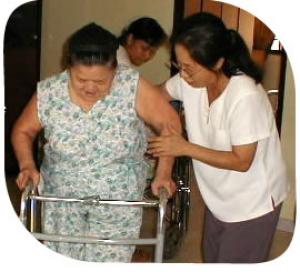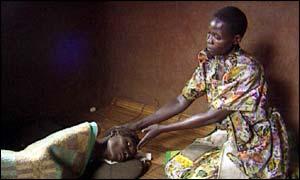MESSAGE OF HIS HOLINESS
BENEDICT XVI
FOR THE EIGHTEENTH WORLD DAY OF THE SICK

Dear Brothers and Sisters,
The 18th World Day of the Sick will be celebrated in the Vatican Basilica next 11 February, the liturgical Memorial of Our Lady of
Lourdes…With the annual World Day of the Sick, the Church intends to carry out a far-reaching operation, raising the ecclesial community's awareness to the importance of pastoral service in the vast world of health care. This service is an integral part of the Church's role since it is engraved in Christ's saving mission itself.
In the mystery of his Passion, death and Resurrection, human suffering takes on meaning and the fullness of light. In his Apostolic Letter Salvifici doloris, the Servant of God John Paul II offers enlightening words in this regard. "Human suffering, has reached its culmination in the Passion of Christ", he wrote. "And at the same time it has entered into a completely new dimension and a new order: it has been linked to love... to that love which creates good, also drawing it out from evil by means of suffering, just as the supreme good of the Redemption of the world was drawn from the Cross of Christ, and from that Cross constantly takes its beginning. The Cross of Christ has become a source from which flow rivers of living water" (n. 18).
At the Last Supper, before returning to the Father, the Lord Jesus knelt to wash the Apostles' feet, anticipating the supreme act of love on the Cross. With this act he invited his disciples to enter into the same logic of love that is given especially to the lowliest and to the needy (cf. Jn 13: 12-17). Following his example, every Christian is called to relive, in different and ever new contexts, the Parable of the Good Samaritan …At the end of the parable, Jesus said: "Go and do likewise" (Lk 10: 37).
With these words he is also addressing us. Jesus exhorts us to bend over the physical and mental wounds of so many of our brothers and sisters whom we meet on the highways of the world. He helps us to understand that with God's grace, accepted and lived out in our daily life, the experience of sickness and suffering can become a school of hope. In truth, as I said in the Encyclical Spe salvi, "It is not by sidestepping or fleeing from suffering that we are healed, but rather by our capacity for accepting it, maturing through it and finding meaning through union with Christ, who suffered with infinite love" (n. 37).
The Second Ecumenical Vatican Council had already recalled the Church's important task of caring for human suffering. In the Dogmatic Constitution Lumen gentium we read that "Christ was sent by the Father "to bring good news to the poor... to heal the contrite of heart' (Lk 4: 18), "to seek and to save what was lost' (Lk 19: 10).... Similarly, the Church encompasses with her love all those who are afflicted by human misery and she recognizes in those who are poor and who suffer, the image of her poor and suffering Founder. She does all in her power to relieve their need and in them she strives to serve Christ" (n. 8)…
I would like here to take up the Message to the Poor, the Sick, and the Suffering which the Council Fathers addressed to the world at the end of the Second Ecumenical Vatican Council: "All of you who feel heavily the weight of the Cross" they said, "you who weep... you the unknown victims of suffering, take courage. You are the preferred children of the
Kingdom of
God, the Kingdom of hope, happiness, and life. You are the brothers of the suffering Christ, and with him, if you wish, you are saving the world" (The Documents of Vatican II, Walter M. Abbott, sj)…
 Lastly, I address you, dear sick people and I ask you to pray and to offer your suffering up for priests, so that they may continue to be faithful to their vocation and that their ministry may be rich in spiritual fruits for the benefit of the whole Church. Lastly, I address you, dear sick people and I ask you to pray and to offer your suffering up for priests, so that they may continue to be faithful to their vocation and that their ministry may be rich in spiritual fruits for the benefit of the whole Church.
With these sentiments, I implore, for the sick, as well as for all who nurse them, the maternal protection of Mary Salus Infirmorum, and I wholeheartedly impart the Apostolic Blessing to all.
BENEDICTUS PP. XVI
|